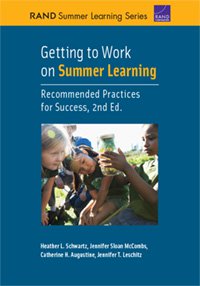

This report updates earlier guidance to school district leaders interested in launching summer learning programs or improving established ones. It offers guidance based on evaluations of five urban school districts conducted between 2011 and 2016. The districts were selected by The Wallace Foundation to take part in the National Summer Learning Project, a multi-year effort to understand whether and how voluntary district-run summer learning programs can help promote success in school.
The report addresses such questions as when districts should begin work on their summer learning program, how they should hire and train teachers, what they should consider in choosing or developing a curriculum, which actions can help boost attendance and keep students on task, how to create a warm and welcoming environment, and how to provide engaging enrichment experiences. Specific recommendations include:
The report also discusses the costs associated with offering a voluntary summer program and provides suggestions for lowering them, such as working with community-basedorganizations and consolidating program sites into as few buildings as possible.
For more hands-on tools and guidance, including a sample program calendar, visit the online Summer Learning Toolkit.

This study was designed to help practitioners, policy-makers, and researchers understand the parent perspective on... read more
This study was designed to help practitioners, policy-makers, and researchers understand the caregiver perspective on... read more
Evidence-based Considerations for COVID-19 Reopening and Recovery Planning: Summer Learning with Academic and Non-Academic Activities... read more
The National Summer Learning Project (NSLP), an initiative of The Wallace Foundation, consists of five... read more